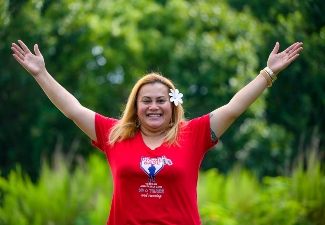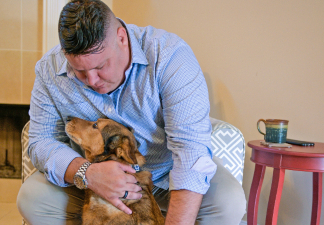Overcoming PTSD, Alcohol Use, and Finding New Purpose

Dan Smee’s life has changed rapidly since returning from Iraq in 2006 after his second stint in the U.S. Army. He served in the 1980s and chose to enlist again after Sept. 11, 2001, deploying to Iraq as a medic with the 81st Brigade Combat Team, and eventually joining the 82nd Airborne Division.
After serving in Iraq, Dan went from an injured soldier struggling through physical pain, alcohol use, and prescription medication to earning a master’s degree in social work. He is now a case worker in the same VA facility where he was treated.
Dan’s road to recovery was long – and change didn’t happen overnight.
A Reluctant Hero Comes Home
Although Dan returned from deployment to a hero’s welcome, physical injuries and invisible wounds made his transition challenging. He carried guilt from being part of a team that lost a platoon sergeant in a horrific explosion. Despite helping to save warrior Dan Nevins, who was critically injured in the same explosion, Dan felt lost and overwhelmed by the tragedies of war.
The guilty feelings and flashbacks of injury and death put Dan in a state of despair. He admits to resorting to “a bottle of Jack Daniels and prescription medication.”
Dan kept reliving the feelings he had picking up body parts off a dusty road. He returned to base and heard the terrible news that Dan Nevins’ doctors would have to amputate one leg and might not be able to save the other .
“I was in total disbelief,” Dan said. “I was going through all the things I did. Did I do something to cause him to injure his leg more? When I got back home a few months later, I continued to blame myself. I thought, ‘Man, Dan Nevins must hate me.’”
To ease the memories that haunted him, including sleepless nights and severe headaches from his own traumatic brain injury, Dan turned to alcohol.
The Link Between Alcohol and PTSD
According to the Department of Veterans Affairs (VA), substance use disorders include dependencies on alcohol as well as illicit and prescription drugs. In service members and veterans, these disorders commonly co-occur and complicate other issues, such as post-traumatic stress disorder (PTSD).
The National Institute on Alcohol Abuse and Alcoholism (NIAAA) reports that more than 50% of individuals with alcohol use disorder and co-occurring PTSD are military personnel and veterans, compared to about 15% of the general population. People with PTSD commonly use alcohol as they try to cope with symptoms or numb memories from a traumatic event.
However, alcohol can make symptoms worse and create more challenges. The National Center for PTSD reports that PTSD sufferers are more likely to be binge drinkers – where a person has four or more alcoholic drinks in less than two hours – which can lead to isolation, increased anger and anxiety, and sleep disruptions.
In its most recent Annual Warrior Survey, Wounded Warrior Project® (WWP) found similar data.
Almost 76% of WWP warriors self-reported PTSD. Of those, 43.6% screened positive for potential hazardous drinking or active alcohol use disorders. Additionally, the warriors who indicated hazardous drinking or active alcohol disorders were more likely to have mental health-related quality of life scores below the median of the general U.S. population.
Hitting Rock Bottom
“I’d have good days, and I’d have not-so-good days. But I kept saying, ‘I’m fine.’ And then, I just spiraled out of control because I was starting to get addicted to alcohol, and I couldn’t stop,” said Dan. “I dug myself a hole. I had a lot of apathy, a lot of despair.”
Dan’s friends and family members encouraged him to seek help, but he continued to tell himself he was OK. Eventually, he got a DUI. Then, a second one.
“That second DUI was a really pivotal moment for me because I had to go to court, and it was the same judge,” Dan recalled.
That judge had offered him a break the first time if he got treatment at the VA, but Dan didn’t follow through. Dan left his watch and wallet home the morning of his second court appearance, expecting the judge to send him to jail – which he did.
“I remember sitting in the holding tank by myself that day,” Dan said. “You know when somebody hits rock bottom? That was it for me. I don’t think I’ve ever felt as low in my life as I did at that point. I was ashamed of what my life had become. I knew that wasn’t the life I wanted to live or lead.”

Nowhere to Go but Up
Dan’s rock bottom became a turning point and a spiritual lifeline. And perhaps the universe was finding a way to get a message across: Dan had a vision of the platoon sergeant who was killed in action. “He was saying to me, ‘Hey man, we’re up here, we’re in a safe place, don’t worry about us. Live your life to the fullest, and don’t have any regrets,’” Dan said.
That experience became an epiphany for Dan. He decided to reclaim the person he knew he was deep inside.
“I told myself that I’ve got to find a way to serve in memory of the guys who are not here anymore,” Dan said. “That snapped me out of what I was going through. So, I stayed in jail for a while, but I dedicated myself to living a life that would serve and honor the memory of those I served with.”
Dan returned to the VA and learned about Wounded Warrior Project. At first, he didn’t think the organization was for him. Then, he saw a public service announcement featuring Dan Nevins. Seeing and hearing someone with whom he had a strong connection convinced Dan to register with WWP™.
Part of WWPs mission is to help warriors who suffer from PTSD and have alcohol issues find support, care resources, and integrated clinical treatment programs to manage their mental health challenges and improve their quality of life.
Reconnecting Through WWP
| A LIFELINE FOR WARRIORS |
|
If you or someone you know has suicidal thoughts, get help right away through one or more of these resources:
|
Dan began attending WWP connection events and joined a WWP peer support group. But it wasn’t until 2010, while at WWP’s annual Courage Awards and Benefits Dinner, which recognizes the service and dedication of those who make the WWP mission possible, that everything clicked.
Dan Nevins was a speaker. “The crowd was just on the edge of their seats listening to him,” Dan said. “And he goes, ‘I want to take a moment. My medic, who was with me in the military and who saved my life, is sitting there. Dan, stand up.’”
It was at this moment that Dan began to see life through a different lens. He decided to extend to himself the same compassion Dan Nevins had shown him.
“I took on a new mission and life of service to my fellow warriors, and I haven’t looked back since,” said Dan, who went back to school, earning both a bachelor’s degree and a master’s degree in social work.
Today, Dan works for the Department of Veterans Affairs. “When I finally got hired at the VA, and I go to my office, it’s the office next to where I first met with a VA social worker. I kind of came full circle,” said Dan.
“I could never envision what my life would be like without Wounded Warrior Project.”
Learn more about opportunities to connect with other veterans and gain access to mental health and wellness programs and resources.
Contact: Cynthia Weiss – Public Relations, cweiss@woundedwarriorproject.org, 904.738.2589
About Wounded Warrior Project
Since 2003, Wounded Warrior Project® (WWP) has been meeting the growing needs of warriors, their families, and caregivers — helping them achieve their highest ambition. Learn more.


